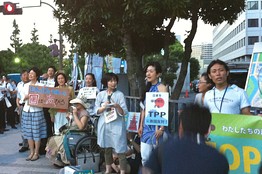Anti-free traders to copy anti-nuke protestors in weekly Tokyo demos

Wall St Journal | August 22, 2012
Anti-free traders to copy anti-nuke protestors in weekly Tokyo demos
By Mitsuru Obe
The Japanese prime minister’s office — for months the scene of weekly anti-nuclear protests in Tokyo — got a new group of demonstrators on Tuesday: A group protesting Japan’s proposed participation in the Trans-Pacific Partnership, or TPP.
For JRT readers who haven’t been following the issue closely, the TPP is a pan-Pacific free trade pact, now under negotiation for a final agreement. Japan is still deciding whether to apply to join the negotiations. Even if Japan applies, it will have to win approval for its inclusion from other member countries including the U.S., which must seek an OK from Congress.
On Thursday, Japanese Prime Minister Yoshihiko Noda and trade minister Yukio Edano are expected to meet Thursday to discuss TPP with U.S. Senator Max Baucus, an influential Democratic senator on trade policy.
“Tell Senator Baucus that Japan doesn’t need the TPP!” shouted one of the protestors in front of the prime minister’s office on Tuesday. “Stop the TPP,” others shouted.
The anti-TPP demonstrators have been inspired by the success of the anti-nuclear protestors, who’ve held a rally every Friday in front of Mr. Noda’s office since April. The anti-TPP groups decided to hold their own rally every Tuesday, “until Mr. Noda gives up the idea of joining the TPP,” according to the organizers. The first anti-TPP rally drew fewer than 100 participants, compared with tens of thousands that regularly show up for the anti-nuke rally.
“The TPP benefits only big businesses,” one banner read. Some people carried hand-held fans with a “Stop the TPP” slogan printed on top, as they lined up on the sidewalk in the hot summer heat.
Among the participants on Tuesday was Nobuhiko Suto, a lawmaker from the ruling Democratic Party of Japan. He told JRT that the rally could soon catch up with its anti-nuke sibling in scale. “The anti-nuke rally also started small.”
Mr. Suto acknowledged that drawing public attention to the cause could be difficult, however. “Compared with a nuclear disaster, the impact of a trade agreement on everyday life is much less visible. Discussions on the TPP tend to become abstract,” he says. Experts predict, however, that farmers across the country would join in the protest if Mr. Noda tries to push ahead with the TPP talks.
The TPP is especially unpopular in farm districts. The trade pact calls for eliminating tariffs on all products, including rice, one of the few crops Japan is self-sufficient in.
Many say it’s highly unlikely that Mr. Noda will pursue formal participation in the talks, fearing public backlash. His party’s popularity is already at a rock bottom after pursuing a series of unpopular policies, such as the restart of nuclear power plants and a hike in the sales-tax rate.
But as the one-year anniversary draws near since Mr. Noda announced his plan to participate in the TPP talks at the Asia-Pacific Economic Cooperation summit in Hawaii, opponents of the TPP have once again grown anxious.
Keiki Ishiyama, a lower house member and the head of the DPJ’s farm affairs subcommittee, says he is worried that Mr. Noda will suddenly declare formal participation in the negotiations. “I won’t stay with the DPJ if Mr. Noda does that,” he said.





